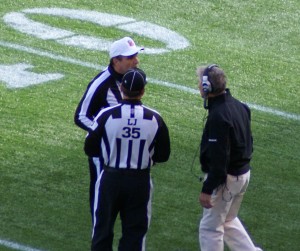 When faced with an important or difficult task, we typically call on the best of our best, those whose performance carries a track record of success. We have all used the phrase “A-Team” to describe this group. But what happens when the A-Team is not available?
When faced with an important or difficult task, we typically call on the best of our best, those whose performance carries a track record of success. We have all used the phrase “A-Team” to describe this group. But what happens when the A-Team is not available?
If you didn’t see it, the blown call at the end of last night’s Monday Night Football game was apparently the final straw. I suppose we can try and look at the glass half full and recognize that this may have been what was needed to end the contract battle between the NFL and the referees and get the A-Team back on the field.
The mistakes and errors of the “replacement refs” had reached the point where the NFL had to make a decision. Continue on with an inferior product or come to a resolution with the seasoned referees. The B-Team, in over their heads, simply did not have the experience to do the job. They did not have respect or credibility to accomplish the mission.
Several thoughts crossed my mind related to what happens when the A-Team is not available and what we can do to make the best out of what we have to work with. Here are 4 things to consider when dealing with the second or third choice for the task at hand:
1. Authority
If your team knows that they are not the first choice, their natural tendency will be to believe that expectations are not as high. As a leader, we need to empower anyone and everyone on our team. Give them the authority to make decisions and hold them accountable for them. Ownership of the decisions will facilitate more effort and more success.
2. Credibility
Just because they are not the first choice does not mean that they are not capable to do the job. Make it know to everyone that you believe in the team to accomplish the task successfully. Credibility will breed confidence and engagement. When others know that you believe in them, they will believe in themselves.
3. Respect
With respect comes trust and trust is a huge part of letting a team operate successfully as a cohesive unit. If your team feels like they are being micro-managed, they will be less likely to make decisions and will most likely look to you or someone else to decide for them. The original idea was to have them handle the project, so let them.
4. Recognition
Any chance for this team to become an A-Team will come from recognizing their success. Regardless of the process, we must recognize the success of the team. This may not be easy and in all honesty, some help may be required along the way. The bottom line is that they will either fail or succeed. If the success is not recognized then you will eventually be faced with the same challenge again.
The replacement referees were treated exactly like that – replacements. If they were viewed a little different, I wonder if there would have been a different outcome. So what do we do when our only choice is the B-Team? Treat them like the A-Team and pretty soon they will be.
***********************************************************************
Don’t miss a single post from Building What Matters by subscribing at the top left of this page.
Help support us by clicking here and Liking our facebook page
Barry Smith www.buildingwhatmatters.com 10/2/12 photo by author

